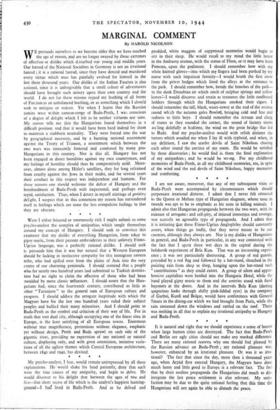Were I either leisured or enormously rich I might submit
to some psycho-analyst the complex of antipathies which tangle themselves around my concept of Hungary. I should seek to convince this examiner that my dislike of everything Hungarian, from tokay to gipsy music, from their peasant embroideries to their unlovely Finno- Ugrian language, was a perfectly rational dislike. I should seek to persuade him that it was but natural that a Western European should be lacking in instinctive sympathy for this immigrant eastern tribe, who had spilled over from the plains of Asia into the very centre of our charming peninsula. I should contend that a people who for nearly two hundred years had submitted to Turkish domina- tion had no right to claim the affection of those who had been moulded by more classic influences. I should assert that the Hun- garians had, since the fourteenth century, contributed as little as other " Turanians " to the general sum of European culture and progress. I should adduce the arrogant ineptitude with which the Magyars have for the last two hundred years ruled their subject peoples and bullied their many minorities. And I should point to Buda-Pesth as the symbol and criticism of their way of life. For in truth that vast dual city, although occupying one of the finest sites in Europe,. is the least satisfying of all European towns. Enormous without true magnificence, pretentious without elegance, emphatic yet without design, Pesth and Buda sprawl on each side of the gigantic river, providing no expression of any national or natural culture, displaying only, and with great ostentation, imitative varia- tions of all the ugliest themes which Central European architecture, between 1840 and 1940, has devised.


























 Previous page
Previous page